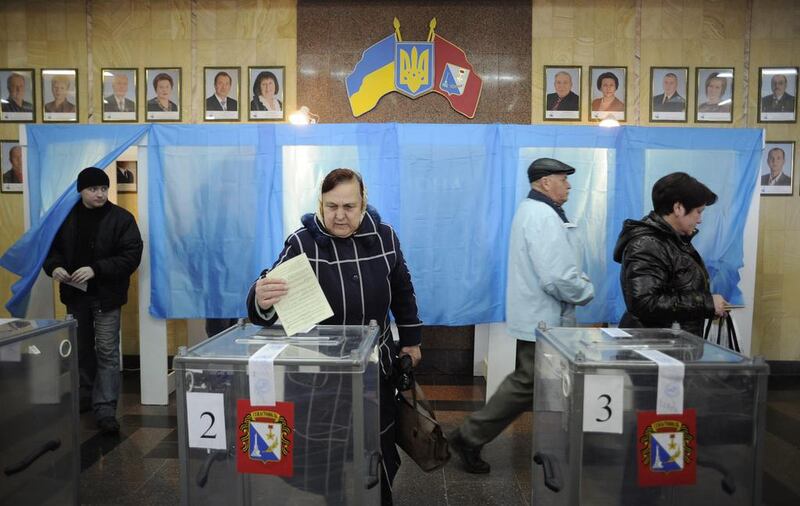SIMFEROPOL, Ukraine // Crimeans on Sunday voted overwhelmingly in favour of joining former political master Russia as tensions soared in the east of the splintered former Soviet nation amid the worst East-West crisis since the Cold War.
Exit polls cited by local officials showed 93 per cent of the voters in favour of leaving Ukraine and joining Russia in the most serious redrawing of the map of Europe since Kosovo’s 2008 declaration of independence from Serbia.
The United States and Europe condemned the referndum on secession as illegal and the country’s new government called a “circus” directed at gunpoint by Moscow.
The vote offered residents of the strategic Black Sea peninsula the choice of seeking annexation by Russia or remaining in Ukraine with greater autonomy.
Opponents of secession appeared to largely stay away from the vote, denouncing it as a cynical power play and land grab by Russia. But the Crimean election commission reported turnout at 75 per cent even before the polls closed – well above the 50 per cent that would make the referendum binding.
A vote backing secession would not only leave Russia facing strong sanctions by the West but could encourage the pro-Russian sentiment that is rising in Ukraine’s east and lead to further divisions in this nation of 46 million.
Western Ukraine and the capital of Kiev are strongly pro-West and Ukrainian nationalist.
The referendum comes two weeks after Russian-led forces seized control of Crimea. Locals say they fear the new Ukrainian government that took over when President Viktor Yanukovich fled to Russia last month will oppress them.
Ukraine’s new prime minister insisted again on Sunday that neither Ukraine nor the West would recognise the referendum, which he said was conducted at gunpoint.
“Now, on the territory of the autonomous republic of Crimea under the stage direction of the Russian Federation, a circus performance is under way: the so-called referendum,” Arseniy Yatsenyuk told a government meeting. “Also taking part in the performance are 21,000 Russian troops, who with their guns are trying to prove the legality of the referendum.”
Russia raised the stakes on Saturday when its forces, backed by helicopter gunships and armoured vehicles, took control of the Ukrainian village of Strilkove and a key natural-gas distribution plant nearby– the first Russian military move into Ukraine beyond the Crimean peninsula of 2 million people. The Russian forces later returned the village but kept control of the gas plant.
Despite the threat of sanctions, Russia’s president Vladimir Putin has vigorously resisted calls to pull back in Crimea. On Saturday, Russia vetoed a UN Security Council resolution declaring the referendum illegal.
The German chancellor, Angela Merkel, spoke to Mr Putin by phone on Sunday and proposed that an international observer mission in Ukraine be expanded quickly as tensions rise in the east. Her spokesman said she also condemned the Russian seizure of the gas plant.
Russian foreign minister Sergey Lavrov and the US secretary of state John Kerry also spoke and agreed to support constitutional reforms in Ukraine that could ease the tensions, the Russian foreign ministry said.
In Donetsk, one of the main cities in eastern Ukraine, pro-Russia demonstrators on Sunday called for a referendum similar to the one in Crimea and some of them stormed the prosecutor general’s office.
In Sevastopol, the Crimean port where Russia now leases a major naval base from Ukraine, speakers blared the city anthem up and down the streets, giving off a block-party feeling. But the military threat was not far away – a Russian naval warship still blocked the port’s outlet to the Black Sea, trapping Ukrainian boats.
At a polling station inside a historic school, tears came to Vladimir Lozovoy, a 75-year-old retired Soviet naval officer, as he talked about his vote.
“I want to cry. I have finally returned to my motherland. It is an incredible feeling. This is the thing I have been waiting for for 23 years,” he said.
But Crimea’s large Muslim Tatar minority – whose families had been forcibly removed from their homeland and sent to Central Asia during Soviet times – remained defiant.
The Crimea referendum “is a clown show, a circus”, said Tatar activist Refat Chubarov. “This is a tragedy, an illegitimate government with armed forces from another country.”
The fate of Ukrainian soldiers trapped in their Crimean bases by pro-Russian forces was still uncertain. Crimea’s pro-Russian authorities had said the soldiers would be considered “illegal” if they did not surrender after Sunday’s vote.
“This is our land and we’re not going anywhere from this land,” Ukraine’s acting defense minister, Igor Tenyuk, was quoted as saying Sunday by the Interfax news agency.
But Ukraine’s acting defence minister, Igor Tenyuk, said yesterday an agreement had been reached with Russia that its forces would not block Ukrainian soldiers in Crimea until Friday. It was not clear exactly what that meant.
On the streets of Simferopol, blue-and-yellow Ukrainian flags were nowhere to be seen but red, white and blue Russian and Crimean flags fluttered in abundance.
Ethnic Ukrainians interviewed outside the Ukrainian Orthodox cathedral of Vladimir and Olga said they refused to take part in the referendum, calling it an illegal charade stage-managed by Moscow. Some said they were scared of the potential for widespread discrimination and harassment in the coming weeks, similar to what happened in parts of nearby Georgia, another former Soviet republic, after its 2008 war with Russia.
Vasyl Ovcharuk, a retired gas pipe layer who worked at Ukraine’s Chernobyl nuclear disaster in 1986, predicted dark days ahead for Crimea.
“This will end up in military action, in which peaceful people will suffer. And that means everybody. Shells and bullets are blind,” he said.
* Agence France-Presse and Associated Press





